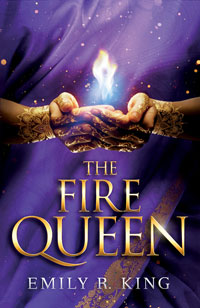| ________________
CM . . .
. Volume XXIV Number 15. . . .December 15, 2017

 |
The Fire Queen. (The Hundredth Queen Series, Book Two).
Emily R. King.
New York, NY: Skyscape (Distributed in Canada by Thomas Allen & Son), 2017.
273 pp., trade pbk., $13.99.
ISBN 978-1-61109-749-8.
Grades 8 and up / Ages 13 and up.
Review by Jonine Bergen.
** /4
|
| |
|

excerpt:
Prince Ashwin toys nervously with a gold cuff around his wrist. “The sovereigns of the neighboring countries are alarmed by Hastin’s insurgence. They want to see him displaced and his rebel army stopped. They agree we require aid, but not on how much and who will supply it.”
“We need allies,” says Brother Shaan, “but the other rulers are reluctant to risk their manpower and resources without being invested in Ashwin’s new empire. Sultan Kuval offered to host a trial tournament to determine who will be responsible for aiding us. All four sovereigns will submit one female competitor to vie as a representative from their nation. Ashwin consented on the condition that he could select the competitor from Tarachand. Your reputation is hailed all over the continent, and as the current kindred, your continued reign would assure our people’s cooperation.”
“What’s the reward for winning?” I ask, dreading the answer.
“My kindred’s throne,” Prince Ashwin replies with a bright smile that does not warm me. “The champion will have the honor of marrying me.”
Kalinda may have defeated an evil rajah in The Hundredth Queen and escaped with her beloved into the wilderness, but her trials are far from over. Now, she and her small band of loyalists must free the Tarachand Empire from a warlord threatening revenge for the persecution his people suffered under the reign of Rajah Tarak, and she must do this with the help of Tarak’s son, Prince Ashwin. Kalinda finds the Rajah’s missing son, Prince Ashwin, safely ensconced in the court of Sultan Kuval. There, she learns that three neighboring kingdoms have agreed to help Ashwin fight to regain his throne – if Ashwin agrees to wed the winner of the trial tournament where each kingdom will provide a woman to fight for the honour. To try to protect his empire from the machinations of the other kingdoms, Ashwin has agreed to this plan if his kingdom also can put forward a champion – Kalinda - in the trial tournament.
So, Kalinda finds herself at the mercy of powerful men who like to watch women fight and maim one another. The odds should be stacked against her as the other women are buhtas, people with mystical elemental powers. But Kalinda is also secretly a buhta, a Burner with the power to control fire. Kalinda, however, must keep her abilities secret because Burners are despised by Sultan Kuval and are not allowed in his court. To further complicate the situation, Sultan Kuval has imprisoned all the Tarachand refugees, including Kalinda’s friends, thereby leaving Kalinda friendless with no emotional support except for the handsome and charismatic young Prince Ashwin who makes no secret that he wants Kalinda for his bride. Finally, the Sultan’s vizier also wants something from Kalinda; a sacred book that has the power to grant any wish – or destroy the world.
As a result, King’s trilogy gets a lot more complicated in The Fire Queen. King continues to develop her world through detailed descriptions of the setting and through the conflicted thoughts and feelings of the main characters. Unlike The Hundredth Queen however, King has Deven and Kalinda tell the story in alternating chapters. Unfortunately, knowing what Deven thinks does not make him more personable or advance the plot. King also spends a lot of time world building in this novel, focusing primarily on the origin of the bhutas. Kalinda’s romance also becomes more convoluted with the introduction of Ashwin as a potential partner. Kalinda is torn between Deven and Ashwin with the ghost of her first husband polluting both relationships. Intrigue abounds, romance simmers, and deceptions deepen.
Recommended.
Jonine Bergen is a librarian in Winnipeg, MB.

© CM Association
CC BY-NC-ND
Hosted by:
University of Manitoba
ISSN 1201-9364
|
This Creative Commons license allows you to download the review and share it with others as long as you credit the CM Association. You cannot change the review in any way or use it commercially.
Commercial use is available through a contract with the CM Association. This Creative Commons license allows publishers whose works are being reviewed to download and share said CM reviews provided you credit the CM Association. |
Next Review | Table of Contents for This Issue - December 15, 2017.
CM Home | Back Issues | Search | CM Archive | Profiles Archive
|
